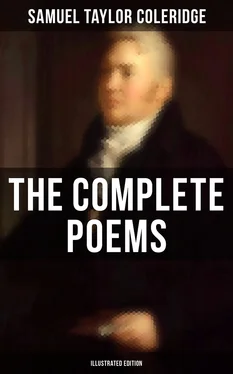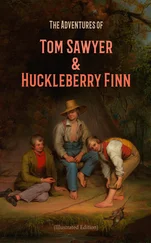Table of Contents
1811-1812
From all that meets or eye or ear,
There falls a genial holy fear,
Which, like the heavy dew of morn,
Refreshes while it bows the heart forlorn!
S. T. C.
TIME REAL AND IMAGINARY
How marked the contrast between troubled manhood, and joyously-active youth in the sense of time! To the former, time like the sun in an empty sky is never seen to move, but only to have moved . There, there it was, and now 'tis here, now distant! yet all a blank between. To the latter it is as the full moon in a fine breezy October night, driving on amid clouds of all shapes and hues, and kindling shifting colours, like an ostrich in its speed, and yet seems not to have moved at all. This I feel to be a just image of time real and time as felt, in two different states of being. The title of the poem therefore (for poem it ought to be) should be time real and time felt (in the sense of time) in active youth, or activity with hope and fullness of aim in any period, and in despondent, objectless manhood—time objective and subjective.
[The riddle is hard to read, but the underlying thought seems to be that in youth the sense of time is like the apparent motion of the moon through clouds, ever driving on, but ever seeming to stand still; whereas the sense of time in manhood is like the sun, which seems to be stationary, and yet, at short intervals, is seen to have moved. This is time felt in two different states of being. Time real is, as it were, sun or moon which move independently of our perceptions of their movements. The note (1811), no doubt, contains the germ of "Time Real and Imaginary" first published in "Sibylline Leaves" in 1817, which Coleridge in his Preface describes as a "school-boy poem," and interprets thus: "By imaginary time I meant the state of a schoolboy's mind when, on his return to school, he projects his being in his day-dreams, and lives in his next holidays, six months hence!" The explanation was probably an afterthought. "The two lovely children" who "run an endless race" may have haunted his schoolboy dreams, may perhaps have returned to the dreams of his troubled manhood, bringing with them the sense rather than the memory of youth, intermingled with a consciousness that youth was gone for ever, but the composition of the poem dates from 1811, or possibly 1815, when the preparation of the poems for the press would persuade him once more to express his thoughts in verse.]
TIME REAL AND IMAGINARY; AN ALLEGORY
On the wide level of a mountain's head,
(I knew not where, but 'twas some faery place)
Their pinions, ostrich-like, for sails outspread,
Two lovely children run an endless race,
A sister and a brother!
This far outstript the other;
Yet ever runs she with reverted face,
And looks and listens for the boy behind:
For he, alas! is blind!
O'er rough and smooth with even step he passed,
And knows not whether he be first or last.
[ P. W. , 1893, p. 187. See, too, Editor's Note , p. 638.]
THE HAG NIGHTMARE
Elucidation of my all-zermalming , [that is, all-crushing] argument on the subject of ghosts, apparitions, &c.
Night-mare is, I think, always, even when it occurs in the midst of sleep, and not as it more commonly does after a waking interval, a state not of sleep, but of stupor of the outward organs of sense—not in words, indeed, but yet in fact distinguishable from the suspended power of the senses in true sleep, while the volitions of reason, that is the faculty of comparison, &c., are awake though disturbed. This stupor seems to be occasioned by some painful sensations of unknown locality (most often, I believe, in the lower bowel) which, withdrawing the attention to itself from the sense of other realities present, makes us asleep to them, indeed, but otherwise awake. And, whenever the derangement occasions an interruption in the circulation, aided, perhaps, by pressure, awkward position, &c., the part deadened, as the hand, the arm, or the foot and leg, or the side, transmits double touch as single touch, to which the imagination, therefore, the true inward creatrix, instantly out of the chaos of elements or shattered fragments of memory, puts together some form to fit it. And this [ imaginatio ] derives an over-mastering sense of reality from the circumstance that the power of reason, being in good measure awake, most generally presents to us all the accompanying images very nearly as they existed the moment before, when we fell out of anxious wakefulness into this reverie. For example, the bed, the curtain, the room and its furniture, the knowledge of who lives in the next room, and so forth contribute to the illusion.... In short, the night-mare is not, properly, a dream, but a species of reverie, akin to somnambulism, during which the understanding and moral sense are awake, though more or less confused, and over the terrors of which the reason can exert no influence, because it is not true terror , that is, apprehension of danger, but is itself a specific sensation = terror corporeus sive materialis . The explanation and classification of these strange sensations, the organic material analogous ( ideas materiales intermedias , as the Cartesians say) of Fear, Hope, Rage, Shame, and (strangest of all) Remorse, form at present the most difficult, and at the same time the most interesting problem of psychology, and are intimately connected with prudential morals, the science, that is, of morals not as the ground and law of duty, but in their relation to the empirical hindrances and focillations in the realising of the law by human beings. The solution of this problem would, perhaps, throw great doubt on the present [notion] that the forms and feelings of sleep are always the reflections and confused echoes of our waking thoughts and experiences.
A MOMENT AND A MAGIC MIRROR
What a swarm of thoughts and feelings, endlessly minute fragments, and, as it were, representations of all preceding and embryos of all future thought, lie compact in any one moment! So, in a single drop of water, the microscope discovers what motions, what tumult, what wars, what pursuits, what stratagems, what a circle-dance of death and life, death-hunting life, and life renewed and invigorated by death! The whole world seems here in a many-meaning cypher. What if our existence was but that moment? What an unintelligible, affrightful riddle, what a chaos of limbs and trunk, tailless, headless, nothing begun and nothing ended, would it not be? And yet scarcely more than that other moment of fifty or sixty years, were that our all? Each part throughout infinite diminution adapted to some other, and yet the whole a means to nothing—ends everywhere, and yet an end nowhere.
[Compare the three last lines of "What is Life?"
Is very life by consciousness unbounded?
And all the thoughts, pains, joys of mortal breath,
A war-embrace of wrestling life and death?
P. W. , 1893, p. 173.]
THAT INWARD EYE, THE BLISS OF SOLITUDE
The love of Nature is ever returned double to us, not only the delighter in our delight, but by linking our sweetest, but of themselves perishable feelings to distinct and vivid images, which we ourselves, at times, and which a thousand casual recollections, recall to our memory. She is the preserver, the treasurer of our joys. Even in sickness and nervous diseases, she has peopled our imagination with lovely forms which have sometimes overpowered the inward pain and brought with them their old sensations. And even when all men have seemed to desert us and the friend of our heart has passed on, with one glance from his "cold disliking eye"—yet even then the blue heaven spreads it out and bends over us, and the little tree still shelters us under its plumage as a second cope, a domestic firmament, and the low creeping gale will sigh in the heath-plant and soothe us by sound of sympathy till the lulled grief lose itself in fixed gaze on the purple heath-blossom, till the present beauty becomes a vision of memory.
Читать дальше












